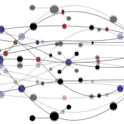Frontiers Communications
Editor
Editor

Life sciences
17 Jun 2016
By K.E.D. Coan, Frontiersin.org Mothers will do anything to protect their children, but mongooses go a step further. Mongooses risk their own survival to protect their unborn children through a remarkable ability to adapt their own bodies, says new research published in Frontiers in Ecology and Evolution. Pregnancy can takes a physical toll that, according to some theories, may increase the mother’s levels of toxic metabolites that cause oxidative damage. Increased oxidative damage can cause complications during pregnancy, but these results show how some mammals have evolved to specifically minimize such damage, albeit only temporarily. “We think mother mongooses shield their offspring by reducing their own levels of oxidative damage during breeding;” explained Dr. Emma Vitikainen of the Centre of Ecology and Conservation at the University of Exeter, and lead author of the study, “However, she could be trading her own long term well being for the short term benefit of protecting the growing pups.” Vitikainen and her colleagues followed groups of wild banded mongooses over five years, measuring oxidative damage markers, as well as the animals’ health and survival. Oxidative damage is a normal byproduct of metabolism throughout an animal’s lifespan, but they found that pregnant mongooses showed lower […]

Frontiers news
15 Jun 2016
Charles Darwin, Sigmund Freud, Rosalind Franklin. As Science enthusiasts trickled in for Frontiers’ first ever Pub Science Meetup on 14 June, we wrote down our name and favorite scientist. Mine is Alfred Wegener, the guy who looked at a map of the earth and thought to himself, Africa and South America look suspiciously like they might have been joined at one point. And thus was born the theory of continental drift. Sadly, no one asked me about the second name on my name-tag, but I had plenty of occasion to learn of other attendees’ heroes. Two ‘science enthusiasts’, as group members are called, explained why they chose Richard Feynman, the theoretical physicist best known for his work on the atomic bomb during World War II. Others who chose Sigmund Freud and Charles Darwin exchanged joint passions for psychotherapy and evolution over a pint of beer and wine, respectively. Perhaps my most interesting discovery of the night, however, was a simple metaphor to explain the translation of DNA into proteins (something I only vaguely remember from high school biology). A zealous autodidact from Dubai who was only in London on holiday attended the event to meet locals and spread his love […]

Health
14 Jun 2016
Learning to train smart with accentuated eccentric loading training can lead to greater strength gains compared to traditional isoinertial loads, shows study by Fernando Bolaños, Frontiersin.org Hitting a plateau in strength training? The answer to overcoming it might lie in accentuated eccentric loading (AEL). Many experienced strength trainers try to overcome a plateau by trying to adapt their strength programme, however this is sometimes ineffective. In just five weeks accentuated eccentric loading training considerably improved results for experienced strength-trainers, a study recently published in Frontiers in Physiology found. This method is based on the principle of repetitive muscle contractions applying a greater external load during the muscle’s lengthening, the eccentric phase of the lift, than in the shortening, the concentric phase. The eccentric phase, for example, is the action of lowering the dumbbell back down from the lift during a biceps curl, as long as the dumbbell is lowered slowly rather than letting it drop. This is different to the very popular isoinertial training where the same weight is used in both stages of the movement. “It is important to train using actions that are highly specific to normal actions. I have always been interested in trying to optimize training because […]

Frontiers news
14 Jun 2016
Philip Calder, Associate Editor for Nutritional Immunology, was named as the 10th recipient of the Danone International Prize for Nutrition. The award was for his “cutting edge” research on fatty acid metabolism and functionality, focusing notably on the immune, inflammatory and cardiometabolic systems. “A particular strength of his research is its translational approach, extending the results of research in mechanistic and basic nutrition science to studies in humans, thereby influencing the development of nutritional guidelines and innovative treatments;” says the Danone Institute, Nutrition for Health. Prof. Calder’s findings have shown that fatty acids – or a lack of them – are involved in a broad spectrum of common diseases ranging from diverse allergies through to atherosclerosis and inflammatory conditions such as Crohn’s disease. The Danone Institute continues: “Prof. Philip Calder has made important contributions, has deepened the scientific community’s understanding of the underlying mechanisms that explain the relationship between nuDanone Prize Ceremony Preview-015trition and immunity, the important first step in the formulation of nutritional advice for better feeding the immune system.” In his Prize Lecture for Danone, Prof. Calder previewed his most recent unpublished findings on the value of omega-3 fatty acids to pregnant women and their offspring Prof. Calder […]

Frontiers news
14 Jun 2016
by George Billman As Editor-in-Chief, it is with great pleasure that I provide this summary of the impact of Frontiers in Physiology. Since April 2010, our journal has published more than 2200 papers (over 400 in 2015) that have been viewed (full article) and downloaded nearly four million times. As many of you may know, Frontiers in Physiology received its Impact factor from Thomson-Reuters’ Science Citation Index (Web of Science) last July (1st impact factor 3.5). As of April 30, 2016, these articles have been cited 12,728 times or 5.51 per paper! Using data available at Scopus, and the Web of Science, the following were the top 25 most cited articles published in 2014: Impact of vitamin D on immune function: lessons learned from genome-wide analysis. R. F. Chun et al., 2014 (37 citations) Primitive and definitive erythropoiesis in mammals. J. Palis et al., 2014 (33 citations) Role of tumor associated macrophages in tumor angiogenesis and lymphangiogenesis. V. Riabov et al., 2014 (31 citations) Vitamin D: a critical and essential micronutrient for human health. I. Bendik et al. (26 citations) The CXCL12/CXCR4 chemokine ligand/receptor axis in cardiovascular disease. Y. Doering et al. (26 citations). Vitamin D and the […]

Frontiers news
13 Jun 2016
As we head into our second annual Editor’s Summit this weekend, we wanted to take a look back of some of our editors who have grown with us through the years. It’s not easy to launch a journal and create a vibrant community around it, but time after time, the dedication of our Field Chief Editors has been rewarded with their journals becoming the most cited in their category. Idan Segev from The Hebrew University of Jerusalem is the Field Chief Editor of Frontiers in Neuroscience. He was with our co-founders when Frontiers was a concept in 2007. He was also there when Frontiers in Neuroscience launched in 2008 and has watched it grow and evolve over the years. “For me it’s an exciting place because I don’t know what will happen next. That is the thing about Frontiers. It’s going to be Frontiers all the time, which allows it to move forward,” he says. Frontiers in Neuroscience has since become the #1 most cited and the #1 largest Open Access publisher of Neuroscience and the #3 most cited and #4 largest Neuroscience publisher overall. Axel Cleeremans from the Université Libre de Bruxelles and is the Field Chief Editor of Frontiers in Psychology. […]

Frontiers news
13 Jun 2016
The Charlesworth Group is pleased to announce its partnership with Frontiers to provide language editing services for its authors globally, coupled with local office support in China. This new arrangement will see The Charlesworth Group providing helpdesk services to Frontiers’ authors and enquirers in Mainland China, and facilitating the management of queries from potential authors alongside marketing and promotional services to support Frontiers’ profile and brand awareness in China. The arrangement will also involve the establishment of Frontiers’ Chinese-language website, geared towards the needs of the local audience. Caitlin Meadows, Publishing Services Director at The Charlesworth Group, commented: ‘The Charlesworth Group is delighted to be working with the Frontiers team and its journal portfolio. We look forward to using our expertise in China to assist their staff, authors, and other potential collaborators with practical, on-the-ground support as well as strategic initiatives to enable Frontiers to develop its outreach among its authorship and readership in the region.’ Frederick Fenter, Executive Editor for Frontiers, also added: ‘We are excited to begin a partnership with The Charlesworth Group. Their expert staff will allow us to build our presence in China, enabling more authors, researchers, and other academics to access, submit to, and engage more fully with our journals and […]

Frontiers news
13 Jun 2016
by Nina Hall Frontiers in Marine Science is proud to announce the winners of our Twitter marine fieldwork photo competition. We asked the marine community to tweet us their favorite fieldwork picture using the hashtag #FMARSfieldpics and #FMARSfieldwork and, my oh my, did we get spoiled! Picking the top three, however, was much less fun than we anticipated because we wanted to crown all of the pictures as winners. Every single photo made our hearts jump with joy as they were utterly beautiful, giving a unique perspective into what fieldwork for a marine biologist can look like at its most exciting. All those photos sweep you away from your desk and drop you right into the sea, tagging sharks, sampling kelp, measuring phytoplankton chlorophyll, facing the elements, wading through seagrass meadows in Zanzibar, and hunting invasive lionfish. Therefore, we decided to display all of the entries in this blog, so an even bigger audience can smell the salt in the air and feel the tropical sun or the arctic chill on their skin. Here are our top three photos. Number three: @RaissaPhilibert Number two: @physiologyfish And finally – Number one: @AJ_Smit Find all the amazing entries in the slideshow below. […]

Psychology
13 Jun 2016
A new study shows that children judge us on our looks – and beauty wins out on trustworthiness ratings by Abigail Pattenden, Frontiersin.org Is beauty only skin deep? Children don’t seem to think so, like adults and babies, children think the uglier you are, the less trustworthy you are. In a study recently published in Frontiers in Psychology, researchers have found that as children, how we perceive someone’s trustworthiness is linked to how attractive we find them. Our ability to make this trustworthiness judgement develops as we grow, becoming more consistent as we approach adulthood, and, girls are better at it than boys. Many psychology studies have proven the existence of the so-called “beauty stereotype”. This describes the phenomenon whereby more attractive people are also considered to be smarter, more sociable and more successful. To be attractive is to be treated better by your peers, and preferred by new-born babies, than uglier people. People use facial cues to make judgements on a person’s character – and this ability to infer social traits is a crucial part of social functioning and development. Although well researched in babies and adults, the development of this ability in children was not previously known. Understanding […]

Psychology
09 Jun 2016
Human nose-witnesses identify criminals in a lineup of body odor By Alice Rolandini Jensen, Frontiers science writer Move over sniffer dogs, people who witnessed a crime are able to identify criminals by their smell. Police lineups normally rely on sight, but nose-witnesses can be just as reliable as eye-witnesses, new research published in Frontiers in Psychology has found. “Police often use human eye-witnesses, and even ear-witnesses, in lineups but, to date, there have not been any human nose-witnesses;” explained Professor Mats Olsson, experimental psychologist at the Karolinska Institutet in Sweden; “We wanted to see if humans can identify criminals by their body odor.” Dogs have been used to identify criminals through body odor identification in court, but it is commonly thought that the human sense of smell is inferior to that of other mammals. However, research shows that humans have the ability to distinguish individuals by their unique body odor. Our olfactory sense is often associated with emotional processing and is directly linked to the areas of the brain associated with emotion and memory; the hippocampus and the amygdala. To find out more about human odor memory following stressful events, Olsson and his team investigated how well we identify body odor […]

Frontiers news
08 Jun 2016
The Grounded Expertise Components Approach in the Novel Area of Cryptic Crossword Solving Kathryn J. Friedlander* and Philip A. Fine Nosewitness Identification: Effects of Lineup Size and Retention Interval Laura Alho*, Sandra C. Soares, Liliana P. Costa, Elisa Pinto, Jacqueline H. T. Ferreira, Kimmo Sorjonen, Carlos F. Silva and Mats J. Olsson Animal Assisted Therapy (AAT) Program As a Useful Adjunct to Conventional Psychosocial Rehabilitation for Patients with Schizophrenia: Results of a Small-scale Randomized Controlled Trial Paula Calvo*, Joan R. Fortuny, Sergio Guzmán, Cristina Macías, Jonathan Bowen, María L. García, Olivia Orejas, Ferran Molins, Asta Tvarijonaviciute, José J. Cerón, Antoni Bulbena and Jaume Fatjó Positive Psychology Interventions Addressing Pleasure, Engagement, Meaning, Positive Relationships, and Accomplishment Increase Well-Being and Ameliorate Depressive Symptoms: A Randomized, Placebo-Controlled Online Study Fabian Gander*, René T. Proyer and Willibald Ruch Clarifying Associations between Childhood Adversity, Social Support, Behavioral Factors, and Mental Health, Health, and Well-Being in Adulthood: A Population-Based Study Mashhood A. Sheikh*, Birgit Abelsen and Jan A. Olsen Limits on Monolingualism? A Comparison of Monolingual and Bilingual Infants’ Abilities to Integrate Lexical Tone in Novel Word Learning Leher Singh*, Felicia L. S. Poh and Charlene S. L. Fu Can Birds Perceive Rhythmic Patterns? A Review and Experiments on a Songbird and a […]

Frontiers news
08 Jun 2016
Frontiers, along with several other publishers, has joined CLOCKSS (Controlled LOCKSS) a non-profit which provides an archive to preserve publications for future generations of researchers. As the publisher of several of the largest and most-cited journals in the world, Frontiers already houses all of their open access on protected servers that are backed up in case of emergencies and power failure. Being a part of CLOCKSS is an additional step to ensure scholarly research published by Frontiers is further preserved. “It is vital for us that our publications remain online for future researchers to use, which is why we are extremely happy to be working with the CLOCKSS archive. It is important for us, and our researchers to know that their work is safe and secure for years to come,” explained Frederick Fenter, Executive Editor, Frontiers. Nearly 300 research libraries and over 200 publishers are currently contributing to the CLOCKSS archive with the goal of ensuring long-term survival of web-based academic publications. This month Frontiers joined seven other publishers and 14 libraries to support the initiative.

Frontiers news
07 Jun 2016
Aspiring entrepreneurs from the Technical University of Madrid (UPM) have created six innovative applications to take research networks and publishing to the next level, as part of the Ideas Competition for Innovation in Research Social Networks actúaloop, an initiative set up by Frontiers in collaboration with the Center of Support for Technological Innovation CAIT – UPM. These new applications give academics innovative ways to share their own work, access publications and engage with their peers. Teams from the university worked for nine months to create the apps using Loop’s APIs, a research network created by Frontiers. The ideas created by the teams range from: translating research in different languages, giving people access to Loop on their mobiles, helping people find the right journal for their research and creating real-time discussion between authors and readers. On 23 June all six finalists, picked from over 30 ideas, will come together for the first ever actúaloop awards ceremony in Madrid and compete for the top three prizes. To reserve your place at the awards, register here. The six finalists are: Frontiers Translate – The universal language in academia is English, but language should not be a barrier when it comes to research. Using […]

Frontiers news
07 Jun 2016
ACTH Prevents Deficits in Fear Extinction Associated with Early Life Seizures Andrew T. Massey, David K. Lerner, Gregory L. Holmes, Rod C. Scott and Amanda E. Hernan* BDNF Genotype Interacts with Motor Function to Influence Rehabilitation Responsiveness Poststroke Christine T. Shiner, Kerrie D. Pierce, Angelica G. Thompson-Butel, Terry Trinh, Peter R. Schofield and Penelope A. McNulty* Temporal Profile of Cerebrovascular Reactivity Impairment, Gray Matter Volumes, and Persistent Symptoms after Mild Traumatic Head Injury Leodante da Costa*, Christiaan Bas van Niftrik, David Crane, Jorn Fierstra and Allison Bethune Sequence Effect in Parkinson’s Disease Is Related to Motor Energetic Cost Sule Tinaz*, Ajay S. Pillai and Mark Hallett The Cerebellum and SIDS: Disordered Breathing in a Mouse Model of Developmental Cerebellar Purkinje Cell Loss during Recovery from Hypercarbia Michele A. Calton, Jeremy R. Howard, Ronald M. Harper, Dan Goldowitz and Guy Mittleman* Distribution and Coexistence of Myoclonus and Dystonia as Clinical Predictors of SGCE Mutation Status: A Pilot Study Rodi Zutt, Joke M. Dijk, Kathryn J. Peall, Hans Speelman, Yasmine E. M. Dreissen, Maria Fiorella Contarino and Marina A. J. Tijssen* Idiopathic Inflammatory Myopathies: Clinical Approach and Management Asma Malik*, Ghazala Hayat*, Junaid S. Kalia and Miguel A. Guzman Artistic Skills Recovery and Compensation in Visual Artists after Stroke […]

Engineering
07 Jun 2016
Our online browsing behavior leaves a unique digital personality signature which can identify us by Tania FitzGeorge-Balfour, Frontiersin.org Hiding online is harder than you’d think, a new study published on Frontiers in ICT has revealed. Your browsing behavior can indicate your personality and provide a unique digital signature which can identify you, sometimes after just 30-minutes of browsing. “Our research suggests a person’s personality traits can be deduced by their general internet usage. This differs from other studies that have only looked at the use of social media platforms, such as Facebook and Twitter,” said Dr Ikusan R. Adeyemi, a research scholar at the Universiti Teknologi, Malaysia, and lead author of this new study. He continued; “This opens up opportunities for new research into understanding online behavior.” Research linking personality traits to computer usage has typically focused on social media. For example, extrovert people tend to use these platforms to enlarge their boundary of friends and influence, while introvert individuals spend more time on social media to compensate for a probable lack of physical interaction. However, a person’s general online browsing behavior can also reflect their choice, preference and reflexes, which is largely controlled by their unique psychological characteristics. This latest study recruited volunteers […]
Get the latest research updates, subscribe to our newsletter